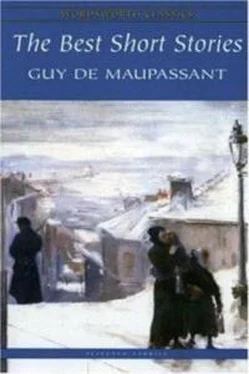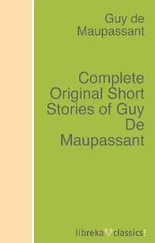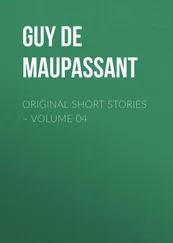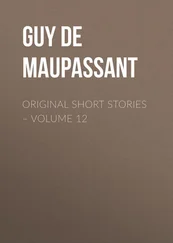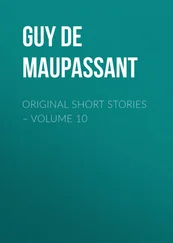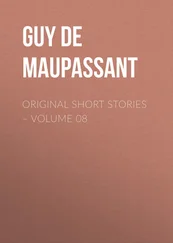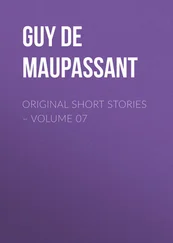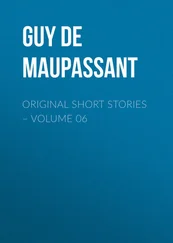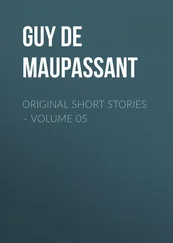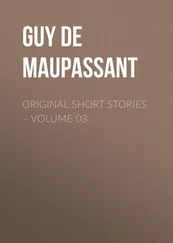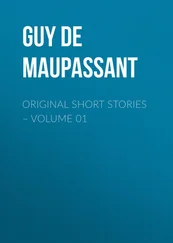"After this he allowed her to kiss him as much as she wished. During the next four years she put into his hands all her savings, which he pocketed conscientiously in exchange for kisses. At one time it was thirty sons, at another two francs. Again, she only had twelve sous. She wept with grief and shame, explaining brokenly that it had been a poor year. The next time she brought five francs, in one whole piece, which made her laugh with joy. She no longer thought of any one but the boy, and he watched for her with impatience; sometimes he would run to meet her. This made her heart thump with joy. Suddenly he disappeared. He had gone to boarding school. She found this out by careful investigation. Then she used great diplomacy to persuade her parents to change their route and pass by this way again during vacation. After a year of scheming she succeeded. She had not seen him for two years, and scarcely recognized him, he was so changed, had grown taller, better looking and was imposing in his uniform, with its brass buttons. He pretended not to see her, and passed by without a glance. She wept for two days and from that time loved and suffered unceasingly.
"Every year he came home and she passed him, not daring to lift her eyes. He never condescended to turn his head toward her. She loved him madly, hopelessly. She said to me:
"'He is the only man whom I have ever seen. I don't even know if another exists.' Her parents died. She continued their work.
"One day, on entering the village, where her heart always remained, she saw Chouquet coming out of his pharmacy with a young lady leaning on his arm. She was his wife. That night the chair–mender threw herself into the river. A drunkard passing the spot pulled her out and took her to the drug store. Young Chouquet came down in his dressing gown to revive her. Without seeming to know who she was he undressed her and rubbed her; then he said to her, in a harsh voice:
"'You are mad! People must not do stupid things like that.' His voice brought her to life again. He had spoken to her! She was happy for a long time. He refused remuneration for his trouble, although she insisted.
"All her life passed in this way. She worked, thinking always of him. She began to buy medicines at his pharmacy; this gave her a chance to talk to him and to see him closely. In this way, she was still able to give him money.
"As I said before, she died this spring. When she had closed her pathetic story she entreated me to take her earnings to the man she loved. She had worked only that she might leave him something to remind him of her after her death. I gave the priest fifty francs for her funeral expenses. The next morning I went to see the Chouquets. They were finishing breakfast, sitting opposite each other, fat and red, important and self–satisfied. They welcomed me and offered me some coffee, which I accepted. Then I began my story in a trembling voice, sure that they would be softened, even to tears. As soon as Chouquet understood that he had been loved by 'that vagabond! that chair–mender! that wanderer!' he swore with indignation as though his reputation had been sullied, the respect of decent people lost, his personal honor, something precious and dearer to him than life, gone. His exasperated wife kept repeating: 'That beggar! That beggar!'
"Seeming unable to find words suitable to the enormity, he stood up and began striding about. He muttered: 'Can you understand anything so horrible, doctor? Oh, if I had only known it while she was alive, I should have had her thrown into prison. I promise you she would not have escaped.'
"I was dumfounded; I hardly knew what to think or say, but I had to finish my mission. 'She commissioned me,' I said, 'to give you her savings, which amount to three thousand five hundred francs. As what I have just told you seems to be very disagreeable, perhaps you would prefer to give this money to the poor.'
"They looked at me, that man and woman,' speechless with amazement. I took the few thousand francs from out of my pocket. Wretched–looking money from every country. Pennies and gold pieces all mixed together. Then I asked:
"'What is your decision?'
"Madame Chouquet spoke first. 'Well, since it is the dying woman's wish, it seems to me impossible to refuse it.'
"Her husband said, in a shamefaced manner: 'We could buy something for our children with it.'
"I answered dryly: 'As you wish.'
"He replied: 'Well, give it to us anyhow, since she commissioned you to do so; we will find a way to put it to some good purpose.'
"I gave them the money, bowed and left.
"The next day Chouquet came to me and said brusquely:
"'That woman left her wagon here—what have you done with it?'
"'Nothing; take it if you wish.'
"'It's just what I wanted,' he added, and walked off. I called him back and said:
"'She also left her old horse and two dogs. Don't you need them?'
"He stared at me surprised: 'Well, no! Really, what would I do with them?'
"'Dispose of them as you like.'
"He laughed and held out his hand to me. I shook it. What could I do? The doctor and the druggist in a country village must not be at enmity. I have kept the dogs. The priest took the old horse. The wagon is useful to Chouquet, and with the money he has bought railroad stock. That is the only deep, sincere love that I have ever known in all my life."
The doctor looked up. The marquise, whose eyes were full of tears, sighed and said:
"There is no denying the fact, only women know how to love."
Pierrot
Mme. Lefevre was a country dame, a widow, one of these half peasants, with ribbons and bonnets with trimming on them, one of those persons who clipped her words and put on great airs in public, concealing the soul of a pretentious animal beneath a comical and bedizened exterior, just as the country–folks hide their coarse red hands in ecru silk gloves.
She had a servant, a good simple peasant, called Rose.
The two women lived in a little house with green shutters by the side of the high road in Normandy, in the centre of the country of Caux. As they had a narrow strip of garden in front of the house, they grew some vegetables.
One night someone stole twelve onions. As soon as Rose became aware of the theft, she ran to tell madame, who came downstairs in her woolen petticoat. It was a shame and a disgrace! They had robbed her, Mme. Lefevre! As there were thieves in the country, they might come back.
And the two frightened women examined the foot tracks, talking, and supposing all sorts of things.
"See, they went that way! They stepped on the wall, they jumped into the garden!"
And they became apprehensive for the future. How could they sleep in peace now!
The news of the theft spread. The neighbor came, making examinations and discussing the matter in their turn, while the two women explained to each newcomer what they had observed and their opinion.
A farmer who lived near said to them:
"You ought to have a dog."
That is true, they ought to have a dog, if it were only to give the alarm. Not a big dog. Heavens! what would they do with a big dog? He would eat their heads off. But a little dog (in Normandy they say "quin"), a little puppy who would bark.
As soon as everyone had left, Mme. Lefevre discussed this idea of a dog for some time. On reflection she made a thousand objections, terrified at the idea of a bowl full of soup, for she belonged to that race of parsimonious country women who always carry centimes in their pocket to give alms in public to beggars on the road and to put in the Sunday collection plate.
Rose, who loved animals, gave her opinion and defended it shrewdly. So it was decided that they should have a dog, a very small dog.
They began to look for one, but could find nothing but big dogs, who would devour enough soup to make one shudder. The grocer of Rolleville had one, a tiny one, but he demanded two francs to cover the cost of sending it. Mme. Lefevre declared that she would feed a "quin," but would not buy one.
Читать дальше
